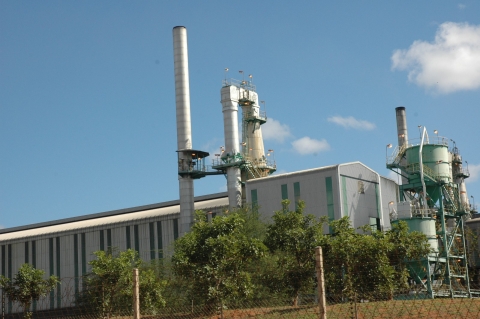
The Mozal smelter in Matola, near Maputo, Mozambique

The Mozal smelter in Matola, near Maputo, Mozambique
Until June this year, the only bypass I knew had to do with heart surgery. But I discovered another kind of bypass when the Mozambican government authorized the Mozal smelter to emit its fumes and dust directly into the air (bypassing filters) during four months while it repairs its fume treatment centres (FTC) at a cost of US$10 million.
Mozal is in Matola, an industrial city (pop. 800,000) located 17 kms from Maputo. The smelter belongs to mining giant BHP Billiton and is the largest foreign investment in Mozambique since independence. It employs 1,200 people and consumes 90% of all the electricity produced in the country.
Bypassing the FTCs means that compounds like hydrofluoric acid and sulphur dioxide – which in large quantities can cause cardiac and respiratory arrest, death, and acid rain – and fine dust particles that can cause asthma, bronchitis and lung cancer will be released into the atmosphere in greater concentrations.
Although Mozal claims that the levels of harmful emissions will not endanger human health or the environment, there was a public outcry against the bypass.
For the first time ever in Mozambique, the leading green NGOs formed a coalition to demand access to information about the emissions and the bypass.
In July, Mozal convened three meetings – for civil society, the media, and the community – to explain what was happening. Activists demanded to see the environmental management plan. Mozal refused.
At the meetings, I realized that neither journalists nor activists had the tools to challenge the slick power points and barrage of technical data presented by Mozal. We did not know the difference between PM10 and PM2.5, or the health consequences of hydrogen fluoride.
This gave me the idea of organizing a training session for journalists on smelter emissions and their impact on public health.
The training would be followed by a public forum about the decade-long experience of monitoring air quality by the stakeholders forum of industry, residents and green groups at Richards Bay, in neighboring South Africa, where BHP Billiton owns a smelter identical to Mozal, called Hillside. The longest Hillside has been authorized to operate on bypass is 72 hours, under protest from green groups and residents.
I secured funding from the Open Society and three green NGOs – Livaningo, Justica Ambiental and Terra Viva – were co-organizers.
The training session on Industrial pollution, corporate responsibility and public health was attended by 15 journalists and five environmental activists. Co-facilitators were:
- Elise Tempelhoff, award-winning environmental reporter for the daily paper Beeld in South Africa and
- Eurico Euripides, research campaign manager for Groundwork.
The first half covered basic science of emissions, types of dust particles and gases emitted, mechanics of a bypass, and environmental regulations.
Now we understood the meaning of: Regarding PM10 particle emissions, the model claims emissions will be within WHO standards (50 micrograms per cubic meter - μg/m3) with a maximum of 40μg/m3 close to the plant.
Wow! here we were, discussing the differences between PM10 and PM2.5 , the need for in-stack continuous monitoring of fumes, the corrosion provoked by sulphur dioxide, and other stuff we knew nothing about before.
The second half of the session dealt with obtaining information from stonewalling corporations, using their reports and corporate mission statements as arguments, complaining to the Johannesburg Stock Exchange Sustainability Index, and being polite and persistent.
During the workshop, Groundwork presented the results of the first ever sampling exercise of air quality in Matola, performed in July. In one week, levels of dangerous particles exceeded the WHO standards by four times. Read here: http://www.opais.co.mz/index.php/sociedade/45-sociedade/9920-populacao-da-matola-respira-ar-poluido-.html
The public forum at the University Eduardo Mondlane was attended by 120 people. The keynote speaker was John Selby, mining expert and founder of the Richards Bay Clean Air Association
The workshop and forum, especially the results of the Matola study, originated full pages in all the weeklies, several TV interviews and radio programs. See:
Johannes Myburgh, the young local correspondent for the South African Press Association said that the training had given him clarity on how to proceed with the story. He was fired up and started writing short items about Mozal 2,3 times a week for SAPA, which were picked up by African media and the South African business press. Read it here:
A few days after the workshop, Mozal made its documents available to the public. Among these is a plan for weekly talks with people and institutions in Matola.
In one weekend, green NGOs collected 14,000 signatures against the bypass, later presented to the National Assembly, which in November devoted one session of debate to the bypass, calling the Prime Minister and Environmental minister to explain.
The bypass became the top media issue, talked about throughout the country. Eventually, Mozal relented in its stonewalling and agreed to share data on the emissions.
This would not have happened without NGO activism, intense lobbying, and sustained press coverage. When I see the journalists who attended the workshop raise their hands at a Mozal press briefing and pose articulate, intelligent, informed questions to the Mozal technical staff, I am pleased and proud of them.